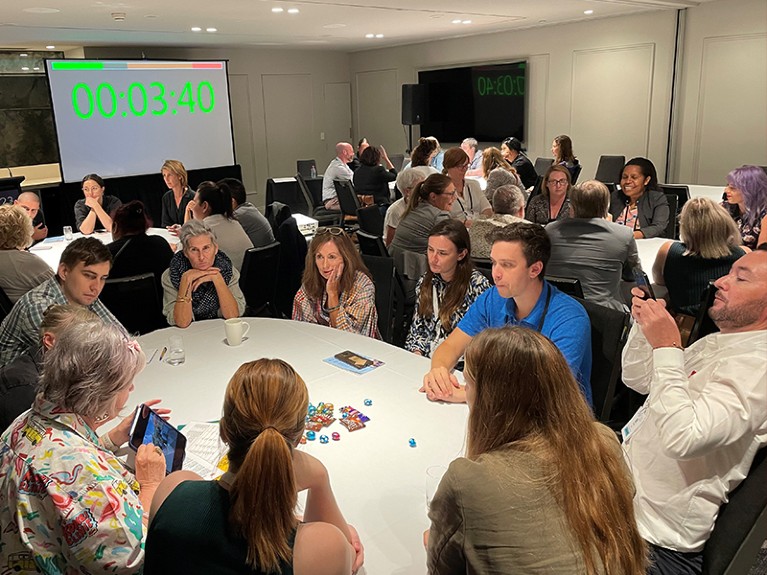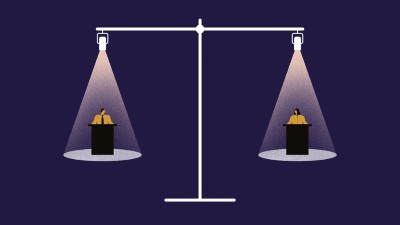
Credit: Martin Poole/Getty
We are five women who have experienced the inherent power dynamics that occur at conferences. We’ve witnessed examples of gender imbalance, such as all-male panels or the tokenistic woman among five men, and watched as the queue to take the audience microphone fills predominantly with male questioners.
What it’s like to be in the minority at a conference
We’ve also seen cultural misrepresentation, such as when one person is asked to speak on behalf of an entire region (it seems unlikely that one person from Vietnam, say, can speak for all of Asia). This undoubtedly marginalizes and disempowers delegates from diverse backgrounds. Collectively, these experiences leave many conference attendees, particularly early-career delegates and those from diverse backgrounds, disappointed and discouraged.
We are early-career researchers who work across disciplines in the Asia Pacific region, although we hail from around the world. We are: a US social scientist; an Aboriginal Australian descendant specializing in Aboriginal health; a Pacific Islander researching pathology and women’s reproductive health; an Australian health economist; and a Canadian clinical epidemiologist. As part of this research group, at conferences we apply a networking activity known as speed geeking to try to minimize power imbalances and create an inclusive environment for delegates.
How scientists are using WhatsApp for research and communication
In speed geeking — which borrows its format from speed dating — speakers, or ‘geeks’, present on their area of expertise to a group of typically 8–10 people, all seated around a table. Each speaker delivers a five-minute talk, which is followed by a five-minute question-and-answer slot. After the ten minutes are up, the geeks rotate to the next table and repeat the process (attendees stay at their designated tables). This continues until the geeks have presented at all of the tables. We’ve found that the speed-geeking format helps to disrupt power hierarchies by creating a more conversational dynamic, rather than people being ‘talked at’. Importantly, we always aim to invite geeks from across disciplines, paying particular attention to the gender and diversity of our speakers.
Putting it into practice
Earlier this year, we approached the organizers of the 1st Australasian Conference on Point of Care Testing for Infectious Diseases (held in March in Sydney, Australia) to implement a speed-geeking session for early- and mid-career delegates. For this conference, the session included geeks speaking on various topics from disciplines such as nursing and health-laboratory work. There were two male and four female speakers, collectively representing Australia and Papua New Guinea. Notably, we didn’t have funding to cover geek registration or travel expenses; thus, our speaker list was limited to attendees who were already registered for the conference (see our top tips).

A speed-geeking session in March at the 1st Australasian Conference on Point of Care Testing for Infectious Diseases in Sydney, Australia.Credit: Lise Lafferty
Overall, the speed-geeking session was well received. Roughly half of the speed-geek attendees completed an evaluation of the session; 91% of respondents said they would be interested in attending future speed geeking, and 100% reported being satisfied or very satisfied with the session. This feedback suggests early- and mid-career delegates are keen to participate in conferences that meaningfully engage attendees in an informal environment.
Successful speed geeking
Here are our top tips for delivering an effective speed-geek session.
Contact organizers well ahead of time. Conference programmes are often developed several months in advance. It is important to seek advance support for a speed-geek session for early- and mid-career delegates, to ensure availability in the programme.
Men dominate conference Q&A sessions — including online ones
Advertise through all conference streams. Work closely with the communications team to ensure that the speed-geek session is listed in the programme (online and hard copy) and advertised alongside other conference activities (for example, on social media and on slides between presentations).
Speed geek at the start. If possible, host the event on the first day to give early- and mid-career delegates a chance to connect with others and sustain those connections throughout the conference.
Be smart with costs. Embed the session into the conference (rather than the days before or after) so there are no or minimal costs to the organizers, such as for extra room hire. Invite speakers who are already planning on attending the conference, to avoid extra travel and accommodation costs.
Cast a wide net when identifying geeks. Consult many colleagues across multiple disciplines and career stages to identify potential speakers. Ensure broad representation of gender, racial and ethnic diversity. We found that six speakers is ideal because it allows engagement and limits the length of the session, while slotting easily into the programme.
How to banish manels and manferences from scientific meetings
Work out the logistics. Ensure the allocated room supports tables for 8–10 people. Use a timer to ensure smooth transitions between the start, Q&A and end of the sessions. Rooms should be large enough to reduce noise crossover between tables.
Allow time for networking. Allocate five minutes at the start of the session for attendees to introduce themselves. The geek will rotate between tables, but delegates at each table will have the opportunity to connect with others in their small group.
We urge those in all disciplines to try speed geeking at their next conference. Making sessions less formal and more inclusive will benefit not just early- and mid-career delegates, but ultimately the field itself.
This is an article from the Nature Careers Community, a place for Nature readers to share their professional experiences and advice. Guest posts are encouraged.
Competing Interests
The authors declare no competing interests.











More News
Author Correction: Stepwise activation of a metabotropic glutamate receptor – Nature
Changing rainforest to plantations shifts tropical food webs
Streamlined skull helps foxes take a nosedive